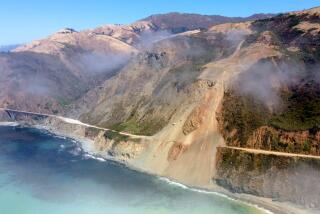Colorado Adopts New Boulder Removal Policy After Accident
- Share via
DENVER — State highway officials promised Thursday that mountain roads would be closed in the future when large rocks are being cleared to prevent a repetition of the accident in which a boulder crashed into a tour bus, killing eight people.
“That (closing roads) is now a standard procedure, whether or not it was done in the past,” Highway Department chief Lowell Jackson told a panel investigating the Monday accident.
Jackson said also that the department will begin depositing large rocks only in wide, level areas, and that maintenance workers will be instructed on how to move them safely.
It is standard procedure to move rocks that might be in danger of falling to more stable locations, the Highway Department said.
Uses Front-Loader
Phil Pacheco, 29, was operating a front-loader to move a 7 1/2-ton boulder onto a ledge on U.S. 40 near the base of Berthoud Pass on Monday when the rock rolled over the ledge and into a Gray Line bus carrying 29 people.
Jackson said Pacheco, who had three years of experience in clearing rocks from mountain roads, was working alone and without supervision because the senior employee in the work crew was on vacation. Jackson said the rock probably would have been handled the same way had the senior worker been present.
In the past, highway crews have not closed roadways below, he said.
Gov. Roy Romer was angered after hearing highway department officials say shortly after the accident that standard procedure did not call for closing roads below rock-clearing operations. He said that policy had to be changed.
Rocks Fall Naturally
Jackson told the panel that rocks frequently fall onto the roadway naturally. Between 1984 and 1986 there were five accidents in which cars struck rocks or boulders on the 10-mile stretch of road where the accident occurred.
“This is not a unique situation,” Jackson said. “All of the rocks (on the slope) will eventually be on the road. It is inevitable.”
Chief engineer Robert Clevenger said decisions on whether to slide the rocks off the road, break them into smaller pieces or truck them away are left to the work crew.
More to Read
Sign up for Essential California
The most important California stories and recommendations in your inbox every morning.
You may occasionally receive promotional content from the Los Angeles Times.













